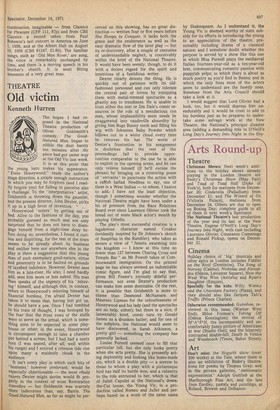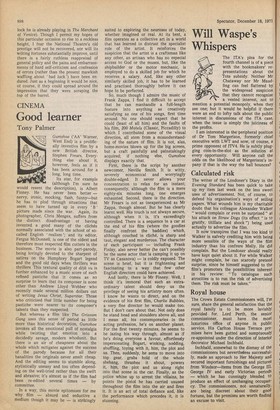THEATRE
Old victim
Kenneth Hurren
The hopes I had reposed in the National Theatre production of
Oliver Goldsmith's comedy, The GoodNatured Man, began to nibble the dust barely ten minutes after the piece had got under way at the Old Vic last week. It is at this point that the young hero makes his appearance. "Enter Honeywood," reads the author's etage direction, a simple enough instruction In which you may be forgiven (and I readily forgive you) for failing to perceive also a challenge. To the ' interpretative ' artist, Goldsmith is throwing down the gauntlet, and the present director, John Dexter, picks
it up in a high fever of invention. , Honeywood ' enters ' by getting out of bed. Alive to the fashions of the day, you Probably guessed as much and are only surprised that he does not have to disengage himself from a night-time doxy before doing so; nevertheless, I found it curious and dispiriting, for the rest of the town seems to be already about its business and neither here nor anywhere else in the Play is there a suggestion that this young man of such exemplary good-nature, virtue and generosity is to be faulted on grounds Of layabed indolence. However, Dexter sees him as a late-riser, He also, I need hardly add, sees him more or less naked. His man then speaks of the urgency of his ' relieving' himself, and although this, in context, refers to Honeywood's relieving himself of financial burdens, I'm afraid Dexter has taken it to mean that, having just got up, he should have a pee. Once I had tumbled to his train of thought, I was besieged by the fear that the front rows of the stalls were to serve as the urinal, which is something soon to be expected in some play house or other; in the event, Honeywood is circumspect enough to take a chamber Pot behind a screen, but I had had a nasty turn (I was seated, after all, well within his range) and I noticed a crimson tide rise Upon many a maidenly cheek in the audience.
It isn't every play in which such bits of ' business,' however irrelevant, would be especially objectionable — the most ribald capers Dexter might devise would fit properly in the context of most Restoration
comedies — but Goldsmith was scarcely more indecorous than, say, Barrie. The Good-Natured Man, as far as might be per
ceived on this showing, has no great distinction — written four or five years before She Stoops to Conquer, it lacks both the grace and the exuberance as well as the easy dramatic flow of the later play — but its re-discovery, after a couple of centuries of understandable neglect, is conceivably within the brief of the National Theatre.
It would have been seemly, though, to do it with a decent regard for the spirit and intentions of a fastidious writer.
Dexter clearly detests the thing. He is quickly out of patience with its old fashioned personnel and can only tolerate the central pair of lovers by equipping them with metal-rimmed spectacles as a ghastly sop to trendiness. He is unable to trust either the text or Jim Dale's comic resources in the role of a mendacious con man, whose implausibility must needs be exaggerated into vaudeville absurdity by giving him Bugs Bunny teeth and filling his wig with Johnsons Baby Powder which billows out in a white cloud every time he removes his hat. The worst of Dexter's frustration in his assignment is doubtless that the rest of the proceedings fail to provide opportunities comparable to the one he is able to exploit in the opening scene, and he can only relieve himself (if he'll excuse the phrase) by bringing on a roistering posse of ' servants ' to punctuate the action with a raffish ballad Needless to say, one of them is a West Indian — to whom, I hasten to add,I have not the least objection, though I sometimes wonder whether the National Theatre might have been under a bit of pressure from the Race Relations Board ever since Laurence Olivier took the bread out of some black actor's mouth by playing Othello.
The play's most successful creation is a lugubrious character named Croaker (evidently inspired by Dr Johnson's sketch of Suspirius in the Rambler), who takes as severe a view of "Jesuits swarming into the kingdom — I know at this time no fewer than 127 between Charing Cross and Temple Bar" as Mr Powell takes of Com monwealth immigration. On the printed page he has always seemed an indomitable comic figure, and I'm glad to say that, given Bill Fraser's joyously doleful per formance, not even Dexter's production can make him seem domitable. Of the rest, it is possible that Goldsmith is more to blame than Desmond McNamara and Maureen Lipman for the colourlessness of Honeywood and his lady (and the spectacles are no help, either); but there is a nice, if lamentably brief, comic turn by Gerald James as a drunken butler; and for one of the subplots, the National would seem to have discovered, in Sarah Atkinson, a pretty girl — something the company has generally lacked.
Louise Purnell seemed once to fill that particular bill, but she only looks pretty when she acts pretty. She is presently act ing deplorably and looking like home-made sin, which is a double pity — a sorrow to
those to whom a play with a picturesque bird has half its battle won, and a calamity to the role entrusted to her, which is that of Juliet Capulet at the National's downthe-Cut house, the Young Vic, in a production called Romeo and Juliet and perhaps based on a work of the same name
by Shakespeare. As I understand it, the Young Vic is deemed worthy of state subsidy for its efforts in introducing the young to an appreciation of the theatre, presumably including drama of a classical nature; and I somehow doubt whether the purpose is served by a show like this one in which Miss Purnell plays the mediaeval Italian fourteen-year-old as a ten-year-old brat, communicating romantic passion with puppyish yelps; in which there is about as much poetry as you'd find in Beano; and in which the only lines most of the actors seem to understand are the bawdy ones. Someone from the Arts Council should take a look at it.
I would suggest that Lord Olivier had a look, too, but it would depress him unendurably and it would be cruel to add to his burdens just as he prepares to undertake some salvage work at the New Theatre, the National's principal disaster area (adding a demanding role in O'Neill's Long Day's Journey Into Night to the Shy
lock he is already playing in The Merchant of Venice). Though I permit my hopes of this particular occasion to rise to a reckless height, I fear the National Theatre's old prestige will not be recovered, nor will its wilting fortunes substantially improve, until there is a fairly ruthless reappraisal of general policy and the pains and embarrassments of hard self-criticism and confession of errors (rather than the present mawkish waffling about bad luck ') have been endured. Just as a beginning it would be nice, of course, if they could spread around the impression that they were scraping the top of the barrel.











































 Previous page
Previous page